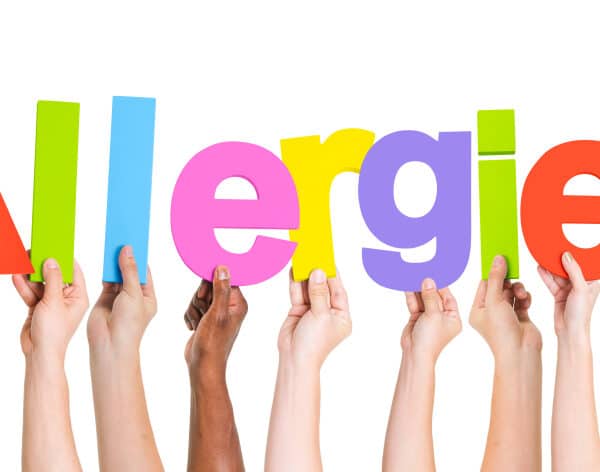 It is estimated that 1-2% of adults and 5-8% of children in the UK have a food allergy, equating to around 2 million people. Symptoms can be mild (itching round the mouth/rash) to more severe (vomiting, diarrhoea) and on occasion, anaphylaxis (shock). In fact around 10 people a year in the UK die from food allergy. As there is no cure, the only way to manage the condition is to avoid the food that makes the person ill. It is therefore important for all food suppliers to provide clear and accurate information about potentially allergenic ingredients.
It is estimated that 1-2% of adults and 5-8% of children in the UK have a food allergy, equating to around 2 million people. Symptoms can be mild (itching round the mouth/rash) to more severe (vomiting, diarrhoea) and on occasion, anaphylaxis (shock). In fact around 10 people a year in the UK die from food allergy. As there is no cure, the only way to manage the condition is to avoid the food that makes the person ill. It is therefore important for all food suppliers to provide clear and accurate information about potentially allergenic ingredients.
The EU Food Information for Consumer Regulation (no. 1169/2011) (EU FIC) covers how allergen information is provided on pre-packed food labels, but it has also introduced a new requirement to provide information on allergenic ingredients in non pre-packed foods to customers.
Mandatory obligation for food caterers
The new allergen regulations, which will apply from 13 December 2014, require food caterers, including those providing food in the health and social care sectors, to inform staff and service users about the presence or use of any of 14 specified allergens in any of the food they serve. A process should be in place to safeguard individuals being provided with food, especially those unable to communicate their dietary needs. To meet these obligations, caterers must know and have evidence of what is in the food they provide and the requirements needed to meet the legal obligations.
The 14 allergens
The 14 allergens referred to in the legislation are recognised across Europe as the most common ingredients or processing aids causing food allergies and intolerances.
These allergens are:
- Cereals containing gluten (wheat including specific varieties like spelt, rye, barley, oats and their hybridises strains) and products
- Crustaceans and products (for example prawns, lobster, crabs and crayfish)
- Molluscs and products ( for example clams, oysters, scallops, snails and squid)
- Egg and egg products
- Fish and products
- Peanuts and products
- Nuts (almond, hazelnut, walnut, cashew, pecan nut, Brazil nut, pistachio, Macademia nut) and products
- Soyabeans and products
- Milk and milk products (including lactose)
- Celery and products
- Mustard and products
- Sesame seeds and products
- Sulphur dioxide and sulphites (where added at >10mg/kg or 10ml/L in the finished product)
- Lupin and products
Some ingredients made from the above have been very highly processed (for example fully refined soyabean oil or wheat glucose syrups) and have been assessed as not posing an allergenic risk. Such substances are exempt and do not need to be declared.
Procurement and purchasing
Caterers will need to ensure that their suppliers provide them with the necessary information to meet their obligations. If pre-packed foods are being used in the preparation of meals, any ingredient containing one of the allergens will be included (and emphasised) in the label ingredient list. Purchasing is recommended from suppliers who provide product specifications including the full ingredients list with allergens. The information on food labels can also be used. In any case all foodstuffs, whether a complete ready-made meal or individual ingredients that are brought in, should have ingredients checked and any of the 14 allergens identified.
Preparation and Recipes
Caterers will need to review the ingredients information for foods they provide. The use of standard recipes facilitates the ability to readily inform consumers about the presence or absence of the 14 allergens. The allergens in each recipe ingredient should be listed and used as a ready reference to show the allergens present. It is important to recognise that brands / different pack sizes may vary. For example, certain brands of prepared potatoes may contain more sulphites as a preservative, and some brands may use different ingredients n different pack sizes.
There should also be a rigorous system to ensure the information is updated. This will include adding new food products into the data when they are sourced and updating product details when ingredients change, or when manufacturers change formulations.
If there are many people in a service that have particular food allergies (may be applicable in children’s services) it may be worth considering special menus for that particular allergy.
Communicating allergen information to service users
Mandatory information on the presence of the 14 allergens should be easily accessible and visible and clearly legible.
Presentation of mandatory allergen information
The requirement is to provide information about the use of allergenic ingredients in a food, but does not require a full ingredients list. Allergen information relating to cereals containing gluten and nuts will, however, need to be specific to type e.g. cereals with gluten (wheat) or nuts (hazelnut) but no specific information is required for fish, molluscs or crustaceans, although this information can be provided voluntarily to be more informative.
Allergen information for non pre-packed food can be communicated through a variety of means to suit the organisation. Allergen information could be provided as a ‘contains;’ statement such as Chicken Tikka Masala (contains: milk, nuts (almond)) or could be provided on a chart as illustrated below:
When food is provided through a buffet format, the allergen information should be provided for each item separately.
Where it is not practical for the information to be provided upfront to the user in a written format (e.g. on a menu), the food provider should use clear signposting to direct the service user or relatives to where this information could be found, such as by asking members of staff.
Allowance for providing information orally
Given the practical difficulties some care caterers may face, organisations have the flexibility to provide allergen information for non pre-packed foods orally. However this would require a written notice close to the point of food that says allergen information is available from a member of staff, and should be supported by that information being available to staff and others in a recorded form. Statements on menus can include ‘Further information regarding food allergens is available upon request; please ask your nurse/carer’ or signposts could be placed in a conspicuous place in the dining room.
Staff training and responsibilities
It is not acceptable to be unsure of whether the foods served contain allergens or to indicate that that all foods served may contain allergens. Allergen information must be easily accessible to staff members to enable them to provide accurate and consistent information to the user.
Training is recommended so that staff know how to handle service user or family requests or questions on food allergies. Those involved in food preparation and service should undertake allergen awareness training routinely delivered along with a system to undertake quality checks of knowledge and understanding. If oral information is being given to service users, staff need to know where to access the correct information so the correct foods can be provided safely for the service user. No staff member should guess the allergen content of food and drink, they must answer with certainty or know where to access the information.
Communication between care and catering staff
Communication between catering and care staff is essential to ensure that safe foods are provided to users with allergy whilst taking care that nutritional requirements are still being met.
Staff responsible for admission assessments should identify any allergies that service users have and ensure that this is documented within the care plan and a clear system is in place notification to the catering team.
Links
Useful links and resources like posters and guides are available on the Foods Standards Agency website and include:
http://www.food.gov.uk/business-industry/guidancenotes/labelregsguidance/nonprepacked#.U9IVPPldXHU







